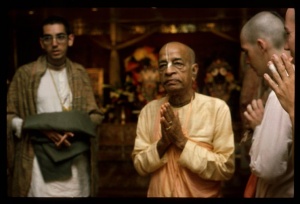SB 4.24.17

A.C. Bhaktivedanta Swami Prabhupada
TEXT 17
- saṅgamaḥ khalu viprarṣe
- śiveneha śarīriṇām
- durlabho munayo dadhyur
- asaṅgād yam abhīpsitam
SYNONYMS
saṅgamaḥ — association; khalu — certainly; vipra-ṛṣe — O best of the brāhmaṇas; śivena — along with Lord Śiva; iha — in this world; śarīriṇām — those who are encaged in material bodies; durlabhaḥ — very rare; munayaḥ — great sages; dadhyuḥ — engaged themselves in meditation; asaṅgāt — being detached from anything else; yam — unto whom; abhīpsitam — desiring.
TRANSLATION
The great sage Vidura continued: O best of the brāhmaṇas, it is very difficult for living entities encaged within this material body to have personal contact with Lord Śiva. Even great sages who have no material attachments do not contact him, despite their always being absorbed in meditation to attain his personal contact.
PURPORT
Since Lord Śiva does not incarnate himself unless there is some special reason, it is very difficult for an ordinary person to contact him. However, Lord Śiva does descend on a special occasion when he is ordered by the Supreme Personality of Godhead. In this regard, it is stated in the Padma Purāṇa that Lord Śiva appeared as a brāhmaṇa in the age of Kali to preach the Māyāvāda philosophy, which is nothing but a type of Buddhist philosophy. It is stated in Padma Purāṇa:
- māyāvādam asac-chāstraṁ
- pracchannaṁ bauddham ucyate
- mayaiva vihitaṁ devi
- kalau brāhmaṇa-mūrtinā
Lord Śiva, speaking to Pārvatī-devī, foretold that he would spread the Māyāvāda philosophy in the guise of a sannyāsī brāhmaṇa just to eradicate Buddhist philosophy. This sannyāsī was Śrīpāda Śaṅkarācārya. In order to overcome the effects of Buddhist philosophy and spread Vedānta philosophy, Śrīpāda Śaṅkarācārya had to make some compromise with the Buddhist philosophy, and as such he preached the philosophy of monism, for it was required at that time. Otherwise there was no need for his preaching Māyāvāda philosophy. At the present moment there is no need for Māyāvāda philosophy or Buddhist philosophy, and Lord Caitanya rejected both of them. This Kṛṣṇa consciousness movement is spreading the philosophy of Lord Caitanya and rejecting the philosophy of both classes of Māyāvādī. Strictly speaking, both Buddhist philosophy and Śaṅkara's philosophy are but different types of Māyāvāda dealing on the platform of material existence. Neither of these philosophies has spiritual significance. There is spiritual significance only after one accepts the philosophy of Bhagavad-gītā, which culminates in surrendering unto the Supreme Personality of Godhead. Generally people worship Lord Śiva for some material benefit, and although they cannot see him personally, they derive great material profit by worshiping him.